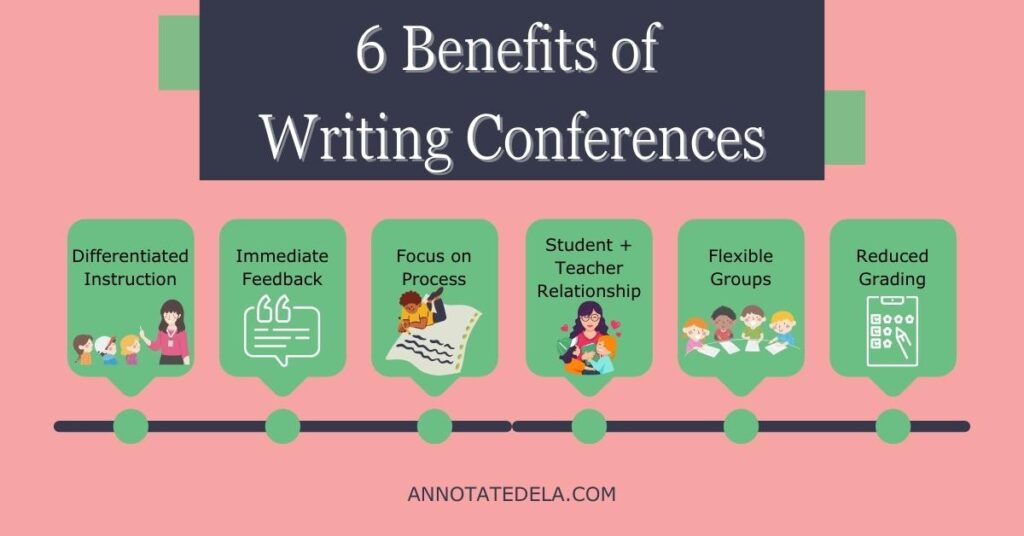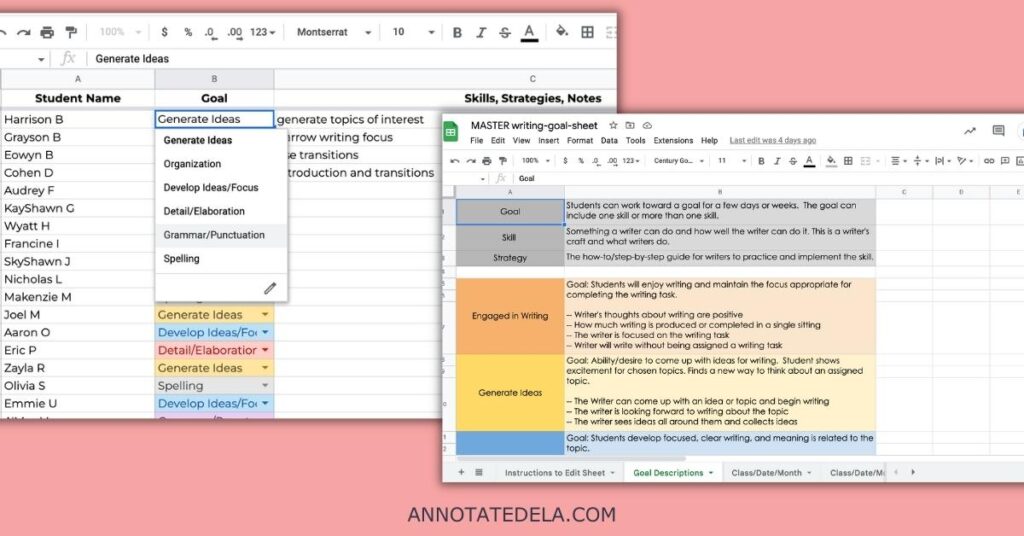Writing conferences in the classroom provide a number of unique benefits for both teachers and students alike. Writing conferences allow for an individualized approach, offering an opportunity to assess student understanding of writing concepts with targeted feedback and instruction. Additionally, writing conferences help to foster collaboration and self-regulated learning skills in students. The benefits of conferencing with students in the classroom will create writing success and build a community of writers.
Want a no-fuss guide to confer with confidence? Grab Writing Conferences: A Beginner’s Guide to Confer with Confidence and begin transforming your classroom’s writing process and community.
Differentiated Instruction
Writing conferences offer a valuable opportunity for differentiating instruction. Each student can be given an individualized writing conference designed to address their particular needs and abilities. This personalized approach allows teachers to meet students where they are in their writing development, thereby motivating and inspiring even the most reluctant writers. With differentiated instruction, students are more likely to experience success and gain confidence in their writing skills.
Immediate Feedback
Another benefit of conferencing with students is that teachers have an opportunity to provide immediate feedback to their students. A conference is a conversation, so students also have the opportunity to provide feedback. The give and take of the feedback process allows the student to be involved in the process and make changes in real-time. The student can leave a conference and immediately use the strategy in their writing and all future writing. This is an opportunity that will truly improve a student’s writing. The feedback the teacher gives in the moment encourages the student to think more critically about their own writing, helping them to become better writers over time.

Writing Conferences Focus Skill & Strategy
Writing conferences give teachers an opportunity to focus on the writing process and the various skills associated with it. The teacher can tailor the skill the student needs to practice and then provide a strategy for achieving that skill. The student can take this feedback and act on it immediately.
Skills to consider:
- Student engagement – maintain the focus appropriate for the writing task.
- Generate ideas – come up with ideas and excited about topics.
- Develop ideas – develop focused and clear writing.
- Organization – writing is easy to follow.
- Detail – quantity and quality appropriate for the piece.
- Grammar/Punctuation – writing is readable.
- Spelling – conventionally spell words correctly.
- Word choice – words communicate an idea.
The skills are broad, but having an idea of where students need to practice helps the teacher to focus on a specific element within the skill and develop a strategy or a “how-to” guide for students to follow to achieve the skill. Want to have the skills and strategy suggestions at your fingertips? Check out Writing Goal Sheet.
For example – a student is not organizing ideas in a way that is easy to follow and may even make the piece unreadable. The teacher might suggest a graphic organizer or two and show the student how to use the organizer and how it can improve their writing. By helping students focus on these important aspects of writing, they become more aware of the writer’s craft.

Student + Teacher Relationship
Writing conferences are an ideal way for teachers to foster meaningful relationships with their students. During the conference, they can offer personalized feedback tailored to each student’s needs. Whether discussing a particular aspect of the student’s writing or offering advice and support, these individualized conversations create meaningful connections between teacher and student.
Conferences are conversations; students also contribute to the conference and share thoughts and ideas about writing. Writing conferences put the responsibility on the student. The responsibility creates a sense of motivation. This builds trust and understanding between the student and teacher; more benefits of conferencing with students.
Flexible Groups
Writing conferences do not have to be restricted to one-on-one conversations. By setting up flexible groups of two, three, or four students, teachers can allow students to get feedback from both the teacher and their peers. This allows students to understand their written work better by engaging with different perspectives and fosters collaboration between peers. Not only are these convenient for the teacher, but they’re also beneficial for the student as they can learn new strategies and techniques from one another.
Small group conferences are one of the many benefits of conferencing with students and can save time when wanting to use writing conferences with all of the classroom time restrictions.

Reduced Grading
Did someone say less grading? I used to spend hours giving feedback on every final draft. It. Was. Exhausting. Not to mention the students NEVER read the feedback and NEVER used any of my suggestions in their writing. I was saying the same thing over and over; I had become a broken record and no one was improving.
I had to stop the insanity, so I started writing conferences with students. All of the feedback started to happen in the moment and students were having to put the feedback into practice BEFORE turning in the final draft. I was also reading or hearing drafts multiple times before students submitted their work. By the time the final drafts were turned in, I knew what to expect. I provide feedback, but it is a lot less and students are starting to read it. It saved hours of work!
The benefits of writing conferences with students are worth the time and effort it takes to get started. So, what are you waiting for? Need tools to get started? Take a look at my Writing Conference Mini Kit.





One Response